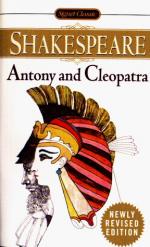|
|
Antony and Cleopatra Author/Context
Most scholars agree that the life of William Shakespeare is a hard one to piece together. There is not a lot of documentation that would traditionally lead to a biography of a person's life. There is very little documentation about Shakespeare. What scholars have been able to come up with is based on bits and pieces of his work (plays, poems, sonnets, critical essays, etc.). However, it must be noted that this information is what is believed by most scholars to be true about Shakespeare, and is not made up of hard facts.
William Shakespeare was baptized on April 26, 1564. Based on this date, many people believe that he was born on April 23. His father was John Shakespeare, from Stratford-upon-Avon, in England. John traded as a glover, dealt in wood, and lent money to earn interest. He also served as a town official. In 1557, he married Mary Arden. She was the youngest daughter of Robert Arden, a wealthy land owner from whom John Shakespeare's father, Richard Shakespeare, had leased land. John and Mary had four sons and four daughters. William was the oldest son. William and his siblings grew up on Henley Street.
On November 28, 1582, William married Anne Hathaway. He was eighteen and she was twenty-six. They had three children: Susanna, and twins: Hamnet (a boy) and Judith.
Throughout the years that followed, Shakespeare achieved the status as the most renowned playwright of Elizabethan theater. In 1597, he bought a rather expensive home in Stratford, called New Place. His family would remain there, while he traveled to London to work. He was associated with a theater named the Globe. His name appeared as one of the owners in 1599. His acting company was known as the King's Men. In 1608 or early 1609, the King's Men purchased and refurbished the Blackfriars Theater, in London. In 1612, some type of financial situation caused Shakespeare to move back to Stratford and withdraw from the daily duties of his professional career. He moved back one year later and continued to work in the theater.
He spent the last few years of his life in Stratford, where it is noted that he finally died on April 23, 1616. He is buried in Holy Trinity Church, in Stratford-upon-Avon. On his tombstone, it says:
Good Friend, for Jesus' sake, forbear
To dig the dust enclosed here;
Blest be the man that spares these bones
And curst be he who moves my bones.
Throughout his life, William Shakespeare wrote 37 (or more) plays, more than 150 sonnets, two lengthy narrative poems and some shorter poems. His work is still recognized today as a great literary achievement. However, over the last one hundred years, the question of authorship has become an issue of interest to many literary scholars. The earliest noted claim that Shakespeare's plays could have been written by someone else appeared in 1856. It was an article in the American journal Putnam's Monthly, written by Delia Bacon. Her article and later book entitled Philosophy of the Plays of Shakespere Unfolded did not achieve great success. But once she proposed this idea of a hidden author, others started to wonder themselves. Still today, the controversy continues over whether or not Shakespeare wrote his own plays. Some people claim that he would not have had the education or training to write such brilliant plays. Still, others rely on a great deal of testimony from Shakespeare's time that says he was a widely respected playwright.
Bibliography
Fido, Martin. Shakespeare. London: Galley Press, 1988.
Levi, Peter. The Life and Times of William Shakespeare. New York: Henry Holt and Company, 1988.
Schoenbaum, S. Shakespeare: His Life, His Language, His Theater. New York: The Penguin Group, 1990.
Shakespeare, William. "Antony and Cleopatra." Shakespeare, The Complete Works. Harcourt, Brace & World, Inc.W.W. Norton & Company, Inc., New York, 1968.




